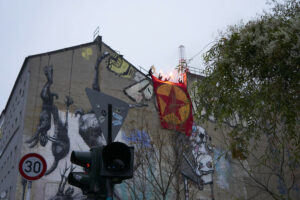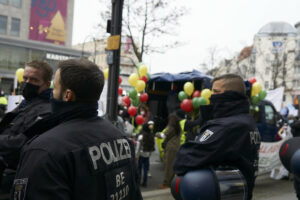This is a shortened version of the original interview, which can be found here, originally broadcast on Radio Helsinki.
This year a climate camp took place in Hamburg from 09.08 to 15.08 involving over 40 organizations. Ende Gelände was there to organize mass actions of civil disobedience. All actions were directed towards twelve new planned LNG (Liquified Natural Gas) terminals at Hamburg Port. Gas is much worse for the climate than CO2, and it’s obtained by fracking. This pumps different chemicals and water at high pressure into the ground, to get at the gas. It is so negative for environment, climate, and health impacts that it is forbidden in Europe. Now, Europe wants to import this from North America.
Elida Castillo is the Program Director for Chispa, which is active in Corpus Christi, Texas, around climate justice.
Josette Hinojasa lives in Brownsville, Texas, and is a member of the South Texas Environmental Justice Network, as well as a member of Chispa.
Chloe Torres is from Corpus Christi, Texas. She is the organizer of the campaign against export of fossil fuels for the Texas Campaign for the Environment.
Tamara Ussner:
You came here for the climate camp and for the climate actions. Where do you live and how does fracking affect your communities?
Chloe Torres:
Where I live, it’s known as the Coastal Bend region because we hug the coast of the Gulf of Mexico. While we don’t have any fracking currently where I live, fracking still impacts our everyday lives. In Gregory, Texas, Cheniere LNG exports more LNG than any other facility in the USA. Cheniere is the top exporter of LNG in North America. Because I am an organizer, trying to build a base of people that oppose this facility. We do that by talking to people who live less than a mile away from this exporter. The stories are really terrifying. When LNG facilities burn off excess gas, they partake in a process called ‘flaring’. This results in a huge ball of fire, lighting up the night sky – making it look like daytime. That’s how bright it is. It shakes their windows. It keeps them up at night. It scares their children.
Many people move here for a lower price, for a nice home. But the realtor don’t tell them they are going to live right next to this fire-ball. The flare is ugly and alarming, but it also emits thousands of pounds of pollution. These include volatile organic compounds, carbon dioxide, sulfur oxide – pollutants linked to cancer, linked to skin and eye irritation, and respiratory illnesses. This in an area where children and the elderly are already disproportionately impacted by respiratory illnesses such as asthma. It’s a nightmare for many who they think they’re moving into this nice quiet area to raise their families, instead they move into a new cancer alley.
Tamara Ussner:
Is it a dry area? I mean, we are at the time right now where the half of the world is burning, so that it is a pretty high risk as well.
Chloe Torres:
Yes, the area is drier than usual because, climate change impacts our daily lives, our regions, in so many different ways that we could have never foreseen. Luckily, there hasn’t been a fire yet. But that is always the risk that people are forced to accept to live in that area. It’s either you normalize it – deal with it every day, or you leave. And leaving for a lot of people is just not an option. A lot of people say we’re all going to be climate refugees in the next 2030 years. But climate refugees are already exist and some are in Texas.
Tamara Ussner:
How does Fracking and LNG affect your communities?
Elida Castillo:
I live less than 8 miles away from Cheniere LNG’s facility, and definitely see the large plume of this flare. It causes a lot of health and environmental issues, but they also take a lot of subsidies from taxpayers. Cheniere is one of the largest recipients of tax abatements and tax subsidies in the state. In this very low-income community, taxpayers in the area pay a lot of money to have these facilities there. Many families like mine have been there for generations and LNG is relatively new, built within the past five years. They target our area and promise that they’ll build a facility safe for the communities, that it’s going to create job. And they pretend we’re going to benefit so much when it’s actually the opposite.
We live in communities with a large number of uninsured people who have to work two to three jobs just to put food on the table because the cost of living is high and wages are low. But they’re exacerbating the problem by this facility that takes a lot from the community and uses a lot of bay water for the cooling towers. That pollutes our water. But also these increased exports cause more pollution in our water from tankers fueled by crude oil. Like a car, whenever you drive tankers, you get emissions. Large, very large crude carriers and LNG tankers leave poison in the water. And that’s the fish that we eat and sustains fishing and tourism industries. It’s causing more soil erosion. And we’re in an area prone to hurricanes, where enough land and sea grasses could mitigate the impact. So those hurricanes cause more and more damage.
Tamara Ussner:
Why is it that such facilities are mostly built in low-income areas?
Elida Castillo:
Affluent people have the means to watch the news or have relationships with political leaders and they will organize and fight against it. When they look at low income communities, they come in with this narrative and say, “oh, we’re going to do great things for your community. We’re going to donate money to different organizations. We’re going to fund your food banks, we’re going to help your schools.” And in these areas people don’t have the time to be following permits, because in Texas, they make it very difficult for you to speak out against these projects. They put the notice in the papers, and hardly anybody gets the paper anymore. They don’t publicize it on social media. Objections must be in person. There’s not enough notice. There’s not any translation provided unless you request it.
So community members just don’t have the time or ability to stay on top of it. Even as organizers, it’s very difficult to keep track of all the permit applications for all facilities in the area. Just imagine the average person who’s just trying to put food on the table.
In the Gregory community where Cheniere was built, many regular community members don’t have advanced degrees. They run for city council or run for Mayor. And so they say to the companies – “that sounds good”. Because either they or family worked in the industry before, and they trust the state to protect them.
Tamara Ussner:
Yeah, we know how well that works under Ted Cruz. So how is it at your home?
Josette Hinojosa:
We’re the last piece of Texas coastline that is not completely industrialized. There have been five proposed projects here. However, only one is still fighting for a chance to come to life – Rio Grande LNG. So we haven’t been affected directly as Elida or Chloe in that sense. However, this is a fight all across Texas because it shouldn’t even exist. If it’s not permitted here in Europe, then why is it that we continue to jack the shit out of our state?
So we haven’t seen them yet, but there are high demands coming in from Europe to produce more because of this energy crisis over the next two to three years. But it should indicate that we need to transition, and do it now because we can no longer be destroying our homelands, our water supply, our air quality, each and every single time these people come in.
A friend moved to where Elida and Chloe are in Corpus. And she’s like, I can’t get rid of these allergies. But it’s not allergies. It’s your body adapting to the chemicals in the air.
Tamara Ussner:
How exactly does your fight on the front lines there look like against LNG and fracking and those industries?
Josette Hinojosa:
So far, the struggle is real. It’s been a process of trying to delay these corporations from getting their funding. So building global alliances with people in France, Australia and Ireland were instrumental in helping us to talk to banks and ask them to divest from these projects. Some of them still have not, but many of them. They’ve heard us and listened to the human side of things, saying ‘hey, this is wrong’. And the struggle really lies in the leadership that we have, local politicians really comfortable with allowing these industries to come in because they refuse to educate themselves. We’ve hosted events to educate them. We’ve invited city council members. They don’t show up. They completely and totally side with these companies.
That’s a clear indicator that these people are getting bought out by these companies. We’ve heard from locals that they take them out to wine and dine them. So this is why they’ve already had their minds made up even before they’ve heard reason.
Chloe Torres:
We’re scrambling for most of the year. There’s no rest because we don’t just have LNG export, we have crude oil exports, we have petrochemical facilities. The largest ethane steam cracker of its kind in the entire world. We are also dealing with proposed desalination facilities. The city Corpus Christi is pursuing those desalination facilities because 80% of our water is used by heavy industry. So they sold all of our water away, and they say, “oh, well, we need to produce more”. We want to have an uninterruptible water supply for our residents. However, we do not use a fraction of the water that heavy industry uses. They want to build four but this water will not be for residents. Our population is not growing that fast.
So a lot of our work is going door to door in and getting people to the door and talking to them about their experiences: “What is your reality living here? Do you like living here? What would you change about it if you could?” and invite them to the next event. Usually a workshop or a teaching. “How well do you know this facility operating within a mile from you that you see every day on your way to work?”
It looks like leadership development. So many people are afraid of power. They see power as this inherently bad thing that when people have it, they are just corrupted. But we teach them that we need power to fight back because we don’t have money. We don’t have the political networks of these companies. But we have each other and many different skills and resources, human resources, to bring to our collective struggles. We train people on how to canvas, how to speak with neighbors, how to plan a direct action, how to participate in a direct action, how to handle the more administrative ‘boring stuff’. A movement needs those to be sustainable. All these different skills really make or break a mass movement of people. So that’s what our work looks like, a lot of outreach and teaching people not to be afraid of themselves and the power that they hold.
Elida Castillo:
I think we all have the same goals: organizing the communities, educating them, creating awareness of how these facilities impact daily life. What does a permit application look like? What does giving public testimony look like? Explaining what the different agencies overseeing the oil and gas industry do. In Texas, that is the Railroad Commission – that’s very misleading.
Being here in Hamburg, participating with Ende Gelände, we formed this alliance with them last year when three LNG terminals wee proposed. Now, unfortunately, because of the war in Ukraine, there’s more. And showing our community, there’s no way that we are wrong when this community over here has the same story. This community on the other side of the globe has the same story. Who’s actually lying here or misleading or misinforming?
We remind the community that this is our home. So many industries have come, built here and then filed bankruptcy and left. We’re left to pick up and do the cleanup. We demand better. We deserve better because ultimately, we cannot eat natural gas.
It’s building up that power. That’s what the fight looks like for us, so that we can educate the community. And then they go back and they start pushing back and asking questions. These facilities don’t want people to be in the know. And so we fight back by saying, ‘look, you have every right to be angry. You have all the tools at your disposal, and let’s change this because our planet cannot sustain this’.
Tamara Ussner:
What does state repression look like regarding direct action or action in general?
Elida Castillo:
The current law says you can be jailed up to ten years as a federal offense. The most stringent offense for ‘blocking critical infrastructure’. To block something that’s going to harm our communities and kill us, they would fine us and jail us. We’re told, you cannot fight for a better community, but you also can’t complain. And we can’t afford to have our European allies freezing. But we don’t care about you dying. That’s what oppression looks like in our communities.
Josette Hinojosa:
Now they’re trying to silence us. They ignore our emails to the county commissioners’ meetings, or conveniently ‘lost’ them at times. Now they will not read anything that we submit in public comment, but you must physically be there in person. More barriers for people. What if they are disabled? What if they are not able to physically be there? And many of us work, like myself, I have to work to support my children, yet I am part of the public. What if I wanted to leave a public comment? Well, they’re not going to consider it at all. So it’s a form of silencing us. It’s gotten to the point of violence at school board meetings. It can be very discouraging, but it’s also makes me want to fight back even harder.
It’s not okay. And it’s quite scary, because what does that say about our voice? They’re trying to silence us by violence. Isn’t that what our country is known for, our freedom of speech? But freedom of speech for who? Clearly it’s not for brown, indigenous BIPOC people. And they make that abundantly clear when they enact violence on our people.
Cloe Torres:
The state works with local federal, county, border patrol, law enforcement. The prison industrial complex in the United States is completely suffocating. That’s why we have to use every tool in our toolbox that doesn’t necessarily look like getting arrested like it does in other countries. We have to be a little bit more innovative in building people power. So it looks like creating art, looks like non-political events, but still politicizing and radicalizing people, through talking about our experiences and validating the daily fear people live with.
Yeah, I’ll say to all organizers and activists out there that just be very careful. It may seem kind of paranoid or ‘extra’ to protect your identity when you’re in the street demonstrating or when posting online. But it really can come back to get you. The Port of Corpus Christi where I live, is the number one exporter of fossil fuels in the USA, they’re huge. They have a huge amount of capital. They also have their own police force. They hire Ex and current FBI agents to work with them. One day I posted a pretty non-abrasive rhetorical statement about the court going to hell for what they did to the Black residents of Corpus Christi. They were pushed out of their homes to make way for corporations and profit. A day later, my father says that an FBI agent had come to our apartment complex looking for me, to talk to me about how my Facebook status update being interpreted as a domestic terrorist threat. So you can be incarcerated over a Facebook status. As Josette said, we think we have freedom of speech in the United States, but when it’s pushing back, when it’s critical of the status quo and the powers that be, you lose that right. So, yeah, just everyone be more careful than you think you should.
Tamara Ussner:
What do you expect or hope for regarding the European climate justice movement?
Elida Castillo:
We hope to form stronger alliances because right now the narrative is that we need to help our European allies. If they transition away from fossil fuels, then that kind of takes away the wind out of the sails of that argument. President Biden, said he’s committed to environmental justice in our communities, but at the same time when the war in Ukraine happened, he authorized Cheniere to increase exports.
So if we can have more support from our European allies and less dependence on fossil fuels, especially those from the Global South, and find ways to transition away from this, it’ll be much appreciated. Holding true to environmental justice means to amplify the voices of the people in the Global South to demand of European governments: “You don’t like this happening in your country? Don’t import it from those who are being silenced and don’t have that voice.”
One more thing. If your government starts talking about hydrogen and carbon capture storage and utilization and green hydrogen, and we’re going to start importing this, be very wary. Because what they’re doing is they’re getting influenced by the oil and gas industry on our side of the world, who use these measures to continue exploiting communities. They’re claiming,”we can solve the climate crisis using this technology to stay in line of that 1.5 degree Celsius”. That’s only going to further harm communities already being harmed by fossil fuel industries. So question things if it sounds too good to be true, and question where they’re going to be getting these resources from. And just stay in touch with us. Thank you for all you’re doing.
Josette Hinojosa:
If our goal is to try to stay within that 1.5 degrees Celsius, then Europeans must recognize that time really is of the essence. Right now is the time for action and pushing hard for renewables. Because while there may be an energy crisis possibly lasting two to three years, it’ll be over in those two to three years. But within that time you guys can transition and push your leaders to do renewables. That helps us on our end because right now ancestral lands are being destroyed, communities are being directly affected by these fossil fuel industries. There is just no more time to second guess or to try to make profit off of this. This is all about short-term profits. No one is seeing how in the long run this affects all of us and it will come back to haunt Europeans if we don’t do something now. So that is the big ask, please push your leaders. Don’t listen to everything that you hear coming from our presidents and leaders because they are bought and sold by corporations, the politicians, most of them are bought and sold.
We need that truth to be told – they would rather build alliances through oil and gas and get a quick profit instead of thinking about the people. But we are the people, including Europeans. It is incumbent upon all of us to act. But especially here, because you all could do something great and help us in the long run by pushing away from fossil fuels and from hypocrisy. Our children cannot wait to see what’s going to happen. We cannot wait to see what’s going to happen. We know what’s happening. The world is on fire. We can no longer entertain these fossil fuel industries. We have to break ties and these cycles. There’s just absolutely no better time than now for Europeans.
We all have trauma. We all carry all of this together. But there’s one thing that we all have and can show one another – kindness and compassion and love. We can build a better world and you guys could help us and lead that movement. It inspires me to see the Fridays for Future. I have two daughters. One of them is 18. She’s disabled. And so a lot of the times the disabled community children are the ones that get forgotten about. I like to believe that if my daughter had that capacity, she would be right here with me demanding a better future. And that’s why I fight for her, because she doesn’t have a voice in this and I have to be her voice. And so this fight is important because that’s all I have. That’s all I can give my children. And all I can do is just fight for a future that they deserve and to fight for a future for the rest of the children. So as a mother and as a parent, I just ask other parents to please stand up. Fight for your children, fight for your grandchildren.
Cloe Torres:
Like Josette was saying, I really hope that the European climate justice movement rejects this idea that has been around for 400 years: That we can sacrifice some people for the sake of ourselves, for the sake of our comfort, for the sake of our desires. That mentality led to colonization, to slavery, incarceration, exploitation. We have to, every single day, reject that part of our imagination while using our hands, our minds, to create something that is in service of that just world that we all hope for, right?
The only impossible demand is that we’re not brave enough to voice and to fight for. So you may think that what you have to contribute is not enough. It’s not a traditional skill that people that study mass movements like to romanticize. But I promise you have something within yourself that you can use to help. And it’s not about just showing up one day at a demonstration, at a protest, and taking your pictures and going home and posting them online and feeling really good about yourself.
Yeah, that is cool. But what you have to do is you have to look for the organizers. You have to look for the people who are already building that world that you say you want and you get with them and you talk every single day and you build something every day, and you invite a new person every single day. The only way we’re getting out of this is if we have enough people to no longer ask nicely, to ask politely – while we’re dying; to demand that they see our humanity. We take it. We use our power and we take what we want un-apologetically, like they do, like the fascists do, like the conservatives do, like the liberals do. We do that and we’ll get everything we want. I need people to not reinvent the wheel, but to look for the people who are already building the world that you want to see and work with them every single day.
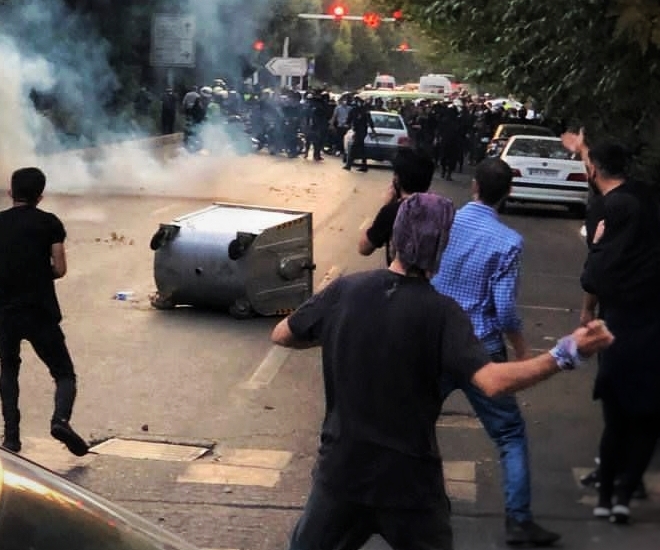
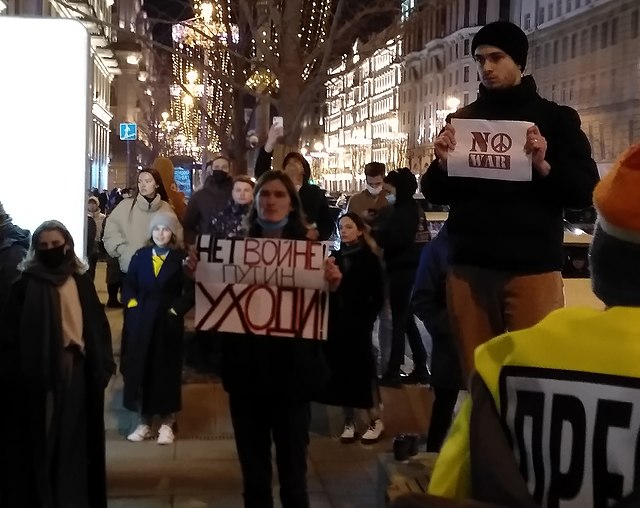
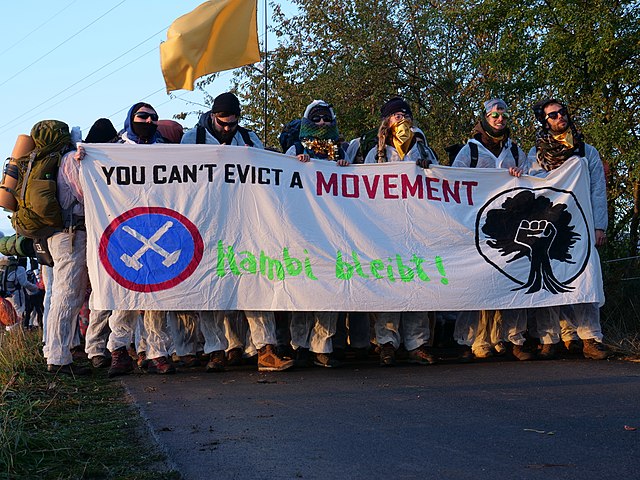
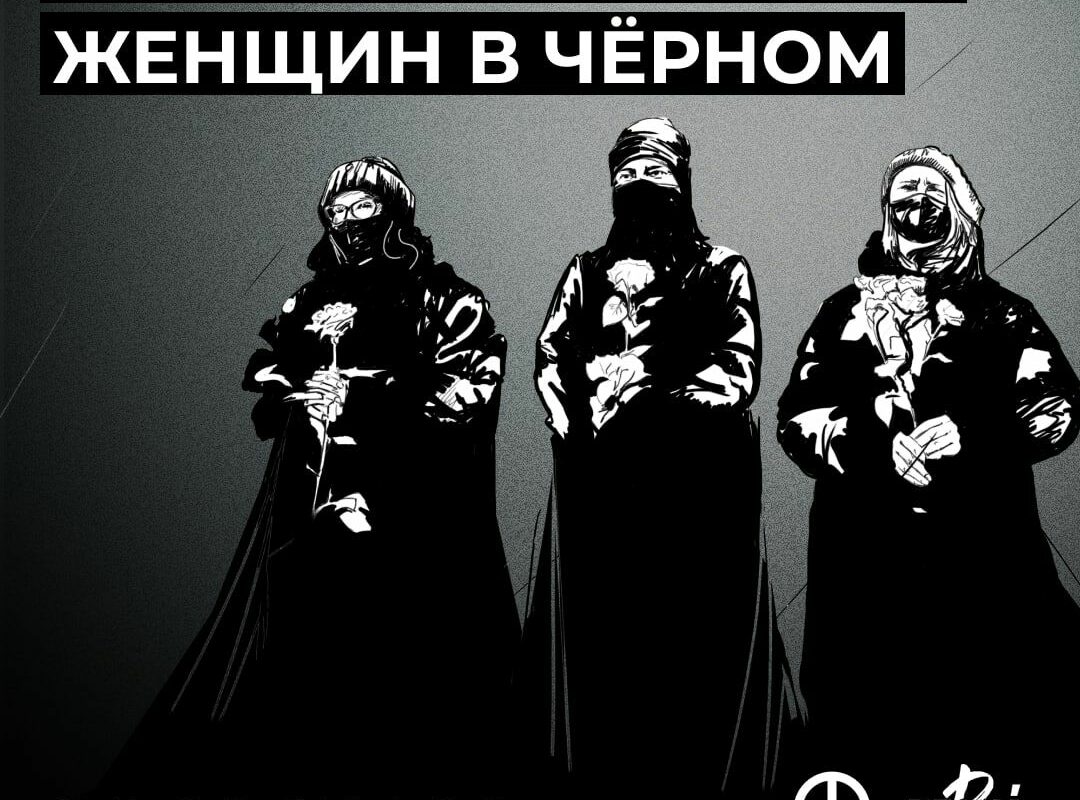
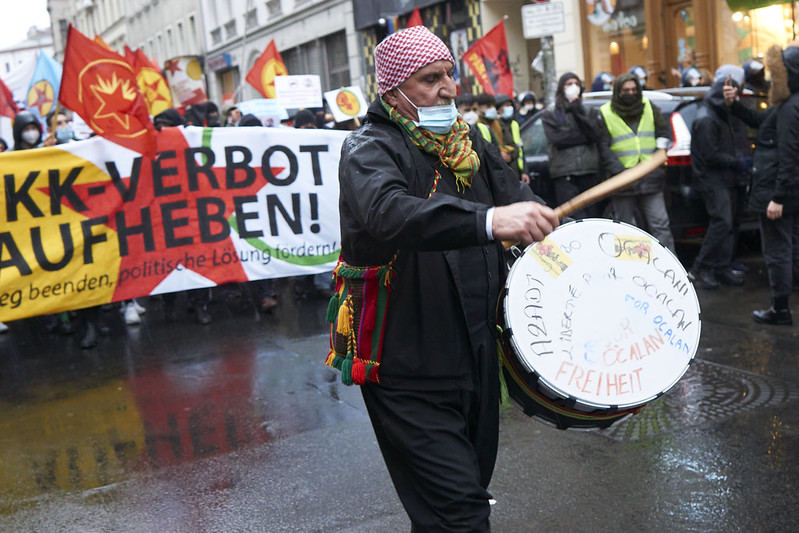
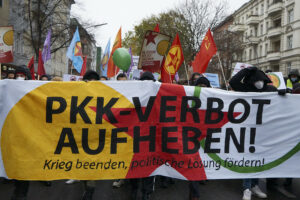
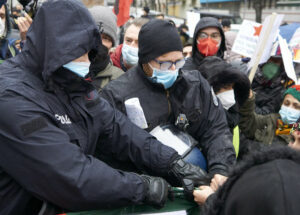
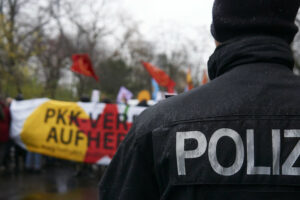
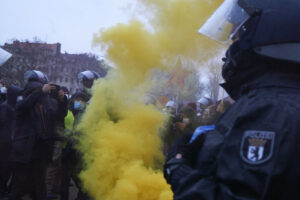 The march reaches the endpoint at Oranienplatz, the place of the last demonstration. During the last few meters, some people inside the demonstration were lighting some smoke flares. As the rest of the crowds entered Oranienplatz the activists lit some bigger flares in the Kurdish colours of yellow, red and green.
The march reaches the endpoint at Oranienplatz, the place of the last demonstration. During the last few meters, some people inside the demonstration were lighting some smoke flares. As the rest of the crowds entered Oranienplatz the activists lit some bigger flares in the Kurdish colours of yellow, red and green.